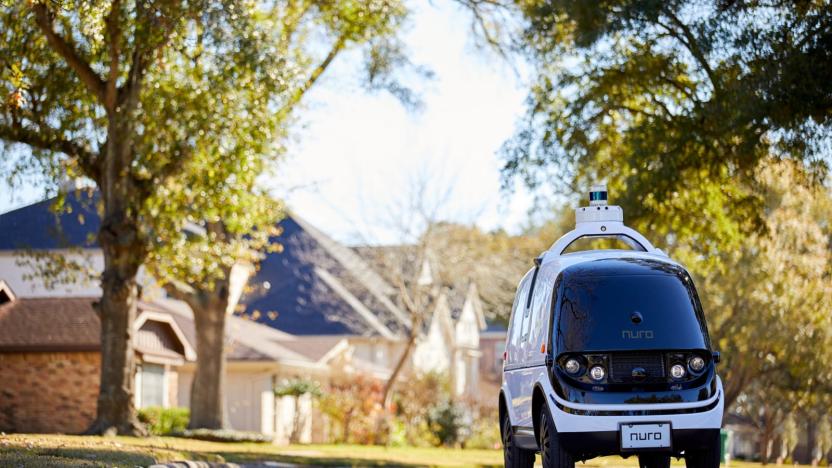exemption
Latest

US DOT approves Nuro's next-gen driverless delivery vehicle design
Today, the US Department of Transportation (DOT) and the National Highway Traffic Safety Administration (NHTSA) approved a regulatory exemption for Nuro's next-generation self-driving delivery vehicle, R2. The exemption allows Nuro to begin public road testing and to prepare for deliveries to customers' homes.

Copyright exemption lets you modify old games to keep them running
You no longer have to dread the day that a game developer shuts off its servers and renders your favorite title unplayable. As part of a series of DMCA copyright exemptions, the US Library of Congress has granted long-sought permission to disable authentication server requirements in games where a server's shutdown will completely break the experience. Historians can even hack the consoles themselves, if necessary. This doesn't allow you to tweak games where you'd only lose multiplayer modes, but it does mean that at least some aspects of a classic game will live on.

Unlocking new phones now banned under DMCA, the EFF weighs in
It was great while it lasted, but the days of users legally unlocking their own phones is over. Back in October of last year, the Library of Congress added an exemption to the DMCA to allow folks to free their new phones for 90 days. That three month window has now closed. Of course, carriers are still free to offer unlocked handsets themselves, and some will also unlock them for you as long as certain conditions are met. "Legacy" or used handsets purchased before today can still be unlocked without any finger-wagging from federal courts. So, what does this mean exactly? Well, Electronic Frontier Foundation attorney Mitch Stoltz told us, "What's happening is not that the Copyright Office is declaring unlocking to be illegal, but rather that they're taking away a shield that unlockers could use in court if they get sued." This does make lawsuits much more likely according to him, but it's still up to the courts to decide the actual legality of phone unlocking. Indeed, it's a grim day for those who want true freedom over their own devices. Stoltz said to us, "This shows just how absurd the Digital Millennium Copyright Act is: a law that was supposed to stop the breaking of digital locks on copyrighted materials has led to the Librarian of Congress trying to regulate the used cellphone market."

DMCA update shuts down new phone unlocking next year, allows rooting (but not for tablets)
And so it passed that Congress didst layeth its blessing on the jailbreaking and rooting of all manner of devices; the hacking community saw the miracle and rejoiced. But that amendment to the DMCA two years ago was just a temporary exemption and the Electronic Frontier Foundation has been vigorously lobbying to get it reinstated. The Library of Congress has now done just that through a new three year extension, but with some serious caveats: After 90 days, unlocking of new phones will be verboten and all tablet mods will still be illegal. This differs from the 2010 decision which did allow unlocking, because the Librarian decided that a recent copyright ruling means fair use rules no longer apply to a handset's OS. It also said the exception isn't needed anymore because carrier rules regarding unlocking are now more liberal -- although the lawmaker may be confounding chicken with egg by that reasoning.

Jailbreaking exemption to DMCA is about to expire, EFF would rather it didn't
Back in 2010, the US Copyright Office added a set of anti-circumvention exemptions to the DMCA, effectively making it legal for smartphone users to jailbreak and/or root their devices. These exemptions, however, were never made permanent and now, they're about to expire. The EFF doesn't want this to happen, which is why it's decided to launch a campaign dedicated to the jailbreaking cause. With this initiative, the EFF is hoping to convince the Copyright Office to renew its exemptions and expand them to a wider range of devices, including tablets and videogame consoles. To achieve this, the organization is calling upon programmers and other jailbreaking enthusiasts to contact the Copyright Office directly, explaining why the ability to freely modify software is so vital to their lives or livelihoods. As the EFF argues, "Concrete examples will help show the Copyright Office why they should renew and expand the exemptions for jailbreaking." If you're interested in getting involved, you can contact the Copyright Office at the coverage link below, though all comments are due by February 5th. Hit up the source link for more details on the EFF's involvement.

FCC caves to Verizon's CableCARD waiver request
The long-standing tilt between Verizon and the FCC over the integration ban has now been settled (for now, that is) -- thanks entirely to the FCC finally caving to Verizon's request for a waiver. Of course, we're sure the likes of Comcast (not to mention its customers) are quite the bitter bunch right about now, but apparently the "unique situation" of the FiOS TV business is good enough to excuse it from making the expensive transition to CableCARD-equipped set-top-boxes. Notably, a number of other mom 'n pop cable providers were also temporarily exempted under the assumption that they would fully comply with the 2009 analog shutoff (as if there was any other choice?). That sound you hear would be Verizon simultaneously releasing a heavy sigh and snickering in the faces of all those carriers who weren't so fortunate.[Via ConnectedHome2Go]





